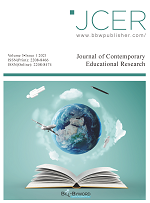Abstract
The development of technology has driven human beings into a globalized world, which requires intercultural communication competence (ICC). As its affective aspect, the subject of intercultural sensitivity (IS) is being heatedly discussed nowadays. This study focuses on the importance of intercultural sensitivity (IS) among Chinese EFL teachers and attempts to explore their current level and the possible reasons for it. For this purpose, questionnaires were distributed to 29 Chinese elementary school English teachers, and the results from the questionnaire showed that the IS level of these teachers is satisfactory, scoring high in five dimensions: interaction engagement, respect for cultural differences, interaction confidence, interaction attentiveness, and interaction enjoyment. The follow-up interview suggested that the high IS level may be a result from intercultural communication training. Moreover, this research found that Chinese teachers were more engaged and enjoyed less in view of scarce opportunities for communication in authentic cross-cultural contexts. Several suggestions and implications for further research have also been included in this article.
References
Portalla T, Chen GM, 2010, The Development and Validation of the Intercultural Effectiveness Scale. Intercultural Communication Studies, 19(3): 21-37.
Chen GM, Starosta WJ, 2000, The Development and Validation of the Intercultural Communication Sensitivity Scale. Human Communication, 3: 1-15.
Alaei MM, Nosrati F, 2018, Research into EFL Teachers’ Intercultural Communicative Competence and Intercultural Sensitivity. Journal of Intercultural Communication Research, 1-14.
Jin H, 2015, Research on the Cultivation of Intercultural Communication Competence in English Teaching. Curriculum Materials and Teaching Methods, 35(11): 80-85.
Wang XY, Pan YL, 2019, Development Status and Enlightenment of Cross-Cultural Foreign Language Teaching Research in China – Based on Bibliometric Analysis (2000-2018). Foreign Language Circles, 2019(4): 76-84.
Byram M, 1997, Teaching and Assessing Intercultural Communicative Competence, Multilingual Matters, Clevedon.
Chen GM, Starosta WJ, 1996, Intercultural Communication Competence: A Synthesis. Communication Yearbook, 19: 353-383.
Chen GM, Starosta WJ, 1997, A Review of the Concept of Intercultural Sensitivity. Human Communication, 1: 1-16.
Xiao SQ, 2014, Empirical Study Intercultural Sensitivity of English Majors in Normal Universities. Journal of Liaoning University of Engineering and Technology (Social Science Edition), 16(1): 87-91.
Han XH, 2014, Current Situation and Reflection on the Cultivation of College Students’ Intercultural Communication Competence – Taking College English Teachers as the Investigation Dimension. Journal of Foreign Languages, 2014(3): 106-110.
Altan MZ, 2018, Intercultural Sensitivity A Study of Pre-service English Language Teachers. Journal of Intercultural Communication, 2018(46): 1-17.
Shao SY, Chen JL, 2011, A Survey on Intercultural Communication Sensitivity of Senior High School English Teachers. Journal of Foreign Languages, 2011(3): 144-147.
Wang WT, Zhou MM, 2016, Validation of the Short Form of the intercultural Sensitivity Scale (ISS-15). International Journal of Intercultural Relations, 55: 1-7.
Paige RM, Jorstad HL, Siaya L, et al., 2003, Culture Learning in Language Education: A Review of the Literature, in Lange DL, Paige RM, (Eds.), Culture as the Core: Perspectives on Culture in Second Language Learning, Information Age Publishing, USA, 173-236.
